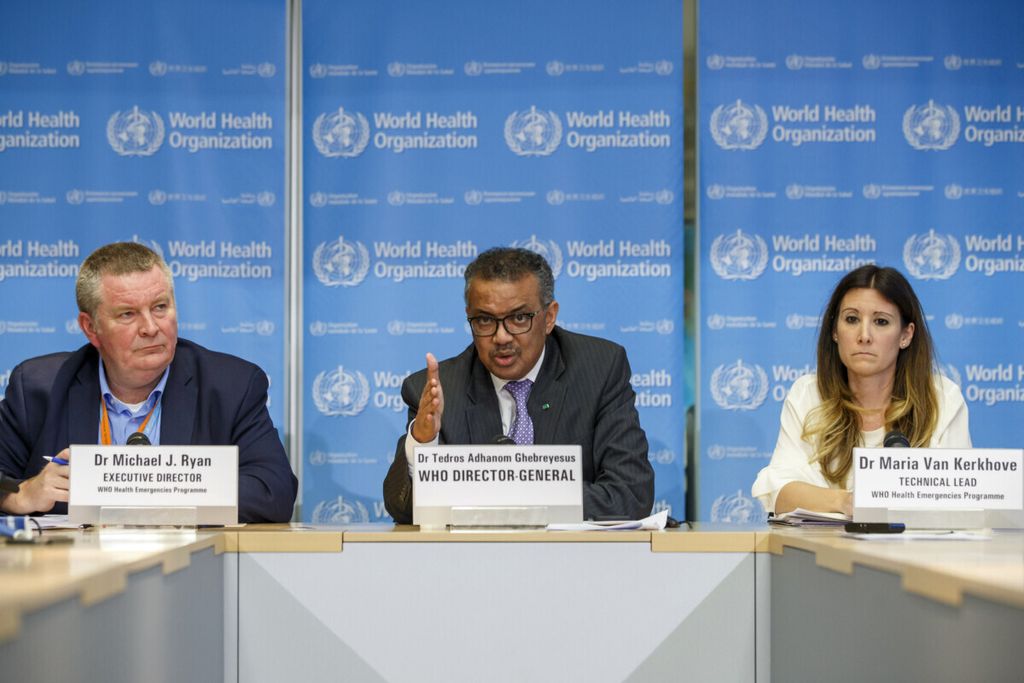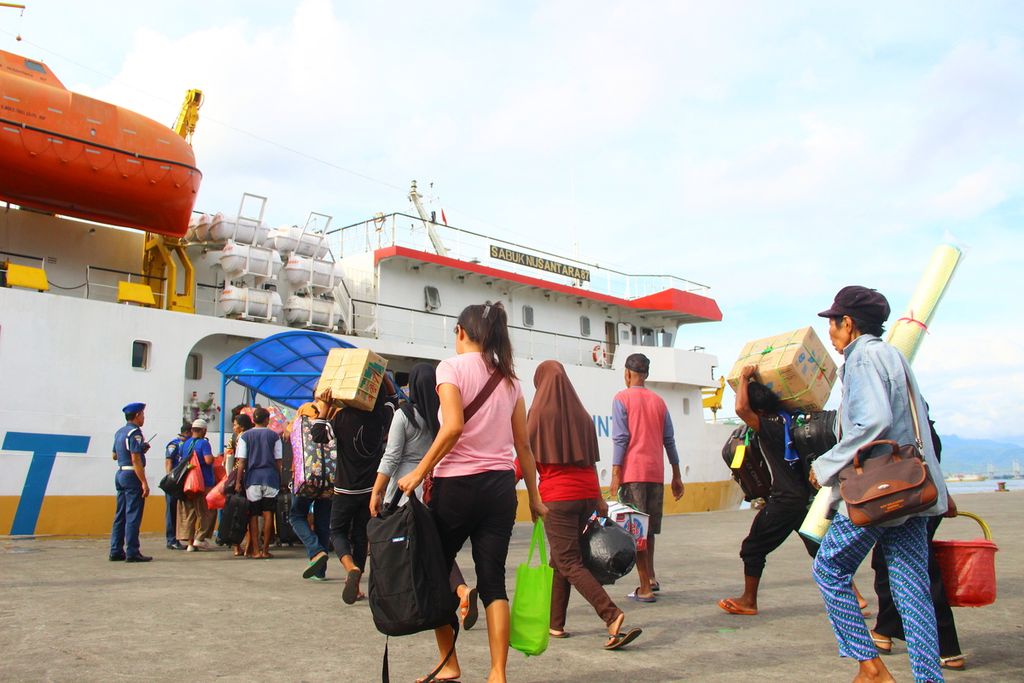Safe ‘Silaturahmi’ amid Pandemic Conditions
The Idul Fitri mudik this year feels different compared to the times before the pandemic.
/https%3A%2F%2Fasset.kgnewsroom.com%2Fphoto%2Fpre%2F2022%2F04%2F13%2F3e7242bc-6392-4b48-9827-c33da87d49aa_jpg.jpg)
Residents queue for free homecoming ticket validation from the Ministry of Transportation at the validation post for the Tangerang City Transportation Service, Jalan Dr. Sitanala, Karangsari Village, Neglasari District, Wednesday (13/4/2022).
The euphoria over mudik (exodus) this year still needs to be accompanied by vigilance against the possibility of Covid-19 transmission. This is especially the case when carrying out the tradition of silaturahmi (brotherhood, kinship) with relatives and when entertaining guests.
Increasingly controlled Covid-19 transmissions have allowed Indonesians to go on mudik this year. After two years of the government urging the public to limit mobility, the opportunity to let go of this homesickness is now wide open even though the pandemic is not yet over.
The Idul Fitri mudik this year feels different compared to the times before the pandemic. As of now, homecoming trips and silaturahmi interactions in hometowns must still be accompanied by the health protocols to maintain the health of the family.
A Kompas poll held on 19-24 April 2022, captured public opinions related to the safety of mudik this year. Additionally, activities planned to be held during the Idul Fitri holiday were also recorded.
Also read:
Although most respondents claimed that they were no longer worried about Covid-19 transmissions, whether while traveling or gathering with family, some respondents were still worried. This concern was expressed by at least one-third of the respondents, who realized that there was still a risk of transmitting the coronavirus.
On the other hand, the public is also confident that they will not be infected with Covid-19 while in their hometowns. Five out of ten respondents admitted that they were not worried about getting Covid-19.
It is possible that current condition of Covid-19 has allowed people to feel more secure about their health. The transmission rate has been on a decline following the Omicron-fueled wave in February 2022. As a result, the majority of public activity restrictions (PPKM) implemented across Indonesia are at levels 1 and 2.
There are still two areas imposing PPKM level 3 in Java and Bali between 19 April to 9 May, namely Serang, Banten and Pamekasan regency on Madura Island, East Java. Meanwhile, 97 cities/regencies have imposed PPKM level 2, while the rest, a total of 29 cities and regencies, have imposed PPKM level 1.

Photo dated Monday, March 9, 2020, Tedros Adhanom Ghebreyesus, director general of the World Health Organization, centre, speaks during a news conference on updates regarding on the coronavirus COVID-19, at the WHO headquarters in Geneva, Switzerland. Accompanying Tedros are Michael Ryan, left, executive director of WHO’s Health Emergencies program, and Maria van Kerkhove, right, technical lead of WHO’s Health Emergencies program.
Conditions of Covid-19 transmissions on Java Island have been spotlighted because it is the destination of most travelers. The results of a recent survey by the Transportation Ministry found that travelers’ main destinations are Central Java, East Java and West Java. Thus, these areas will see an influx of travelers. Additionally, Covid-19 vaccination coverage, including booster shots, have been deemed sufficient to protect against coronavirus transmissions. Even so, the public should not be negligent, considering that during holiday celebrations, there is great potential to meet many people during gatherings.
Health protocols
Celebrating Idul Fitri is driven by the tradition of silaturahmi with relatives, neighbors and friends. This was conveyed by a majority of respondents, whether they returned to their hometowns or not. There will also be a lot of gathering as shown by the statements of 83 percent of respondents who intend to hold an open house and invite relatives and neighbors to visit.
Also read:
Mudik Travelers by Motorcycle: Between Need and Safety
Thus, it is important for the public to implement the health protocols during silaturahmi. Public awareness of this matter was also illustrated by the poll. Nearly 70 percent of respondents said they would implement procedures such as always wearing masks, diligently washing hands with soap or applying hand sanitizer and trying to stay away from crowds. At the very least is to maintain your own health to remove the possibility of spreading the virus. Moreover, two out of 10 respondents even claimed that they would reprimand those who did not follow the health protocols, like wearing masks, while meeting.
The poll also found that nine out of ten respondents also planned to provide hand washing facilities and hand sanitizers for guests visiting during the holiday. This shows that although the public appears to be less worried about transmissions of the virus, they are still aware about the implementation of the health protocols.
Also read:
Odd-Even Traffic Policy Trial On Toll Road Starts Today
Nonetheless, the public must remain vigilant, especially when masks are removed to eat, for example. The riskiest times for Covid-19 transmissions to occur during Idul Fitri is when masks are taken off, which will happen often when eating and drinking dishes provided by the host.

Homecomers boarded the Nusantara Belt 87 Motor Ship at Yos Sudarso Port, Ambon on Wednesday (12/18/2019).
The poll also revealed that 90 percent of respondents will provide dishes for guests who visit, whether in the form of snacks or main courses, such as ketupat sayur (rice cakes with vegetable curry) and opor ayam (chicken curry).
Remember that family gatherings means that there will be interactions with people of various ages and health groups.
Therefore, we must remain disciplined in wearing masks. Wearing a mask is still one of the most effective ways to prevent Covid-19 transmissions, despite having been fully vaccinated and receiving a booster shot. Remember that family gatherings means that there will be interactions with people of various ages and health groups.
Vulnerable groups such as the elderly and people who cannot get vaccinated due to comorbidities need to be paid more attention. Toddlers, too, are part of the vulnerable group.
Discipline in the implementation of the health protocols, diligently washing hands and continuing to maintain cleanliness must be upheld during mudik so that the tradition of silaturahmi during the holiday will bring joy that is supported by good physical health of each family member. Most importantly, remain disciplined in the implementation of the health protocols and anticipate that the pandemic will soon recover. (Kompas R&D)
(This article was translated by Kesya Adhalia)